#Sigismund Schlomo Freud
Text
instagram
#Instagram#ig#filosofia.incerta#psicologia#psicanálise#psychology#psicoanálisis#sigmund freud#freud#Sigismund Schlomo Freud#biografias#quotes#frases#trechos#citacoes#citas#textos#reblog#conduta.cult#psicólogos#psicanalistas
3 notes
·
View notes
Text
maybe i wouldn’t be thinking about my english professor rn if my father wasn’t absent
0 notes
Text
Meet Sigmund Freud
Picrew | Picrew does not belong to me

Sigmund Freud (Sigismund Schlomo Freud)
Just Doyle’s suggestiveness x 10. I hate him and won't be delving further. Would psychoanalyze you just to mess with you. If you know, you know. Whatever you do, it's lose-lose; there is no winning. Everyone hates his ass. -OG Notes
The enigmatic neurologist. You can try to get rid of him, but he’ll just cock his head and raise a brow. “My, afraid of confrontation, no?” Yeah, he’s psychoanalyzing every behaviour of yours and putting two and two together. Slides up beside you as you walk in town, and will hang off every word you say. What makes you tick? Hmm?
He lives in a small house just outside the city; it’s modest and very cozy. When he doesn’t think anyone is looking, he smokes his pipe while reading the paper. He becomes a lot more soft at home.
Voice Claim; Kent Ito
Birthday; May 6
Height; 172
Occupation; Neurologist
Hobbies; Reading, dream analysis
Dislikes; Corrupt government
Specialty; Psychoanalysis
Weakness; Nice people
Favourite food; Cholent
Hated food; Eel
Animal Companion; An orange tabby cat named Karl
Not doing the history this time cuz I'm tired and have learned more than enough about Freud during my studies <3 If you know, you know. He hates eels because he had to spend months looking at how the hell they mate and reproduce and came up with nothing; so he is bitter. That's all you're getting because I really don't feel like writing for him <3 Here, have his wiki.
Present
His suggestive air is indeed an act; he really just wants to sit at home, pet his cat, and read one of his many books that lies in his collection. Still an awful tease, but calms down a bit once he gets to know someone.
If you are genuinely nice to him, he doesn't know how to really act. But if you hate him, he just continues on with the behaviour until you snap. So that's what makes your brain tick. Very interesting.
@azulashengrottospiano
#ikevamp oc#sigmund freud#that is all i am writing on for him#but yeah; he's got divus crewel's va#do what you will with that information#i hate him your honour#<- this is just me lying to myself and i know it#but i will die in denial before admitting ANYTHING
31 notes
·
View notes
Text

me and the gang when somebody disrespects Sigismund Schlomo Freud
2 notes
·
View notes
Text
🎂 Azi îl celebrăm pe Sigmund Freud.
Cărțile autorului au astăzi preț special, cu până la 37% reducere față de prețul afișat.
0 notes
Text
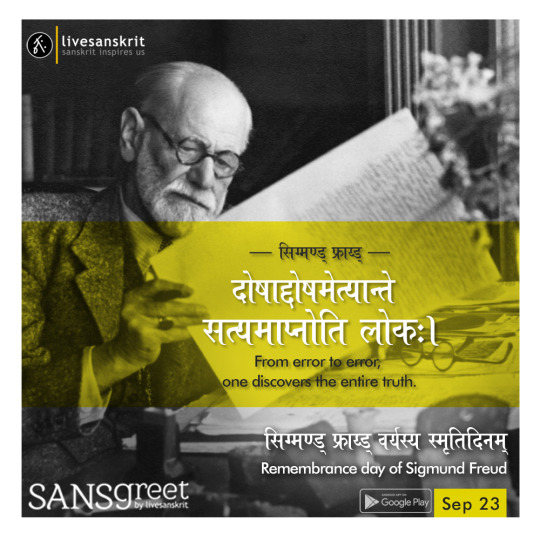
Send from Sansgreet Android App. Sanskrit greetings app from team @livesanskrit .
It's the first Android app for sending @sanskrit greetings. Download app from https://livesanskrit.com/sansgreet
Sigmund Freud.
Sigmund Freud (born Sigismund Schlomo Freud; 6 May 1856 – 23 September 1939) was an Austrian neurologist and the founder of psychoanalysis, a clinical method for treating psychopathology through dialogue between a patient and a psychoanalyst.
Freud was born to Galician Jewish parents in the Moravian town of Freiberg, in the Austrian Empire. He qualified as a doctor of medicine in 1881 at the University of Vienna. Upon completing his habilitation in 1885, he was appointed a docent in neuropathology and became an affiliated professor in 1902. Freud lived and worked in Vienna, having set up his clinical practice there in 1886. In 1938, Freud left Austria to escape Nazi persecution. He died in exile in the United Kingdom in 1939.
#sansgreet #sanskritgreetings #greetingsinsanskrit #sanskritquotes #sanskritthoughts #emergingsanskrit #sanskrittrends #trendsinsanskrit #livesanskrit #sanskritlanguage #sanskritlove #sanskritdailyquotes #sanskritdailythoughts #sanskrit #resanskrit #sigmundfreud #sigmundfreudquote #neurologist #psychoanalysis #psychoanalyst #psychopathology #austria #moravia #hampstead #london #celebratingsanskrit #universityofvienna #unitedkingdom #ego #superego
#greetingsinsanskrit#sanskritgreetings#sanskrittrends#trendsinsanskrit#livesanskrit#sanskrit#celebratingsanskrit#sigmund freud
0 notes
Photo
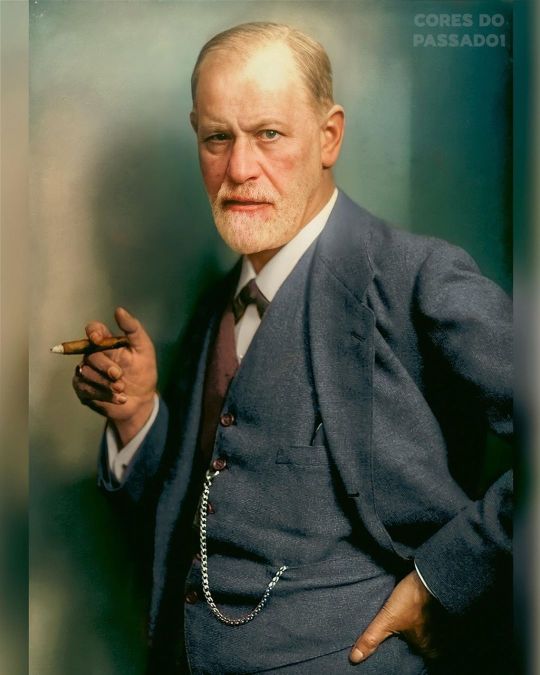
Sigmund Freud (nascido Sigismund Schlomo Freud; Freiberg in Mähren, 6 de maio de 1856 – Londres, 23 de setembro de 1939) foi um neurologista e psiquiatra austríaco. Freud foi o criador da psicanálise e a personalidade mais influente da história no campo da psicologia. A influência de Freud pode ser observada ainda em diversos outros campos do conhecimento e até mesmo na cultura popular, inclusive no uso cotidiano de palavras que se tornaram recorrentes, mas que surgiram a partir de suas teorias. Expressões como "neurose", "repressões", "projeções" popularizaram-se a partir de seus escritos. (Continua...) Foto: Internet Info: Wikipedia Colorização: @coresdopassado1 • • • • • #sigmundfreud #sigmundfreudexplica #sigmundfreudquotes #sigmundfreudmuseum #sigmundfreuduniversity #sigmundfreudmuseumvienna #sigmundfreudfrases #psicanálise #psicanalise #colorização #colorizaçãodigital #colorizacaodefotografia #colorization #colorización #colorizations #photoshop #restauraçãofotográfica #restauraçãofotografica #brasil #brasil🇧🇷 #venezuela🇻🇪 #portugal🇵🇹 #italy🇮🇹 #france🇫🇷 #spain🇪🇸 (em Manaus - Amazons - Brazil) https://www.instagram.com/p/Ci2sslgORzK/?igshid=NGJjMDIxMWI=
#sigmundfreud#sigmundfreudexplica#sigmundfreudquotes#sigmundfreudmuseum#sigmundfreuduniversity#sigmundfreudmuseumvienna#sigmundfreudfrases#psicanálise#psicanalise#colorização#colorizaçãodigital#colorizacaodefotografia#colorization#colorización#colorizations#photoshop#restauraçãofotográfica#restauraçãofotografica#brasil#brasil🇧🇷#venezuela🇻🇪#portugal🇵🇹#italy🇮🇹#france🇫🇷#spain🇪🇸
1 note
·
View note
Text
"La mente è come un iceberg: galleggia con solo un settimo della sua massa sopra la superficie."
Sigmund Freud
Sigismund Schlomo Freud, noto come Sigmund Freud (Freiberg, 6 maggio 1856 – Londra, 23 settembre 1939), è stato un neurologo, psicoanalista e filosofo austriaco, fondatore della psicoanalisi, la più antica tra le correnti della psicologia dinamica.
Le sue scoperte in questo campo, costituirono una svolta nello studio della psiche umana e posero le basi per nuovi sviluppi.
Nonostante la complessità della mente umana resti ancora un mistero, grazie alle ricerche di Freud si poté comprendere meglio quanto i pensieri, più o meno consci, influiscano e interagiscano con i sentimenti e sui comportamenti.
Freud senza forse saperlo, avvalorò ancor più una sapienza antica che precorse i tempi dei grandi trattati scientifici, e che troviamo espressa in Proverbi 20:5
dove leggiamo:
"I pensieri nel cuore dell'uomo sono acque profonde, solo chi ha discernimento sa come attingervi".
Possiamo anche affermare con certezza, che noi stessi possiamo fare molto per mantenere il nostro benessere psico fisico.
Infatti sia abitudini di vita che sociali, sane ed equilibrate, sono indispensabili per crescere in maturità e capacità e mantenere una discreta serenità interiore.
📚Per approfondire questo tema così importante e trovare suggerimenti pratici, vedi gli articoli:
"Che effetto può avere la tecnologia sulla tua mente? L’impatto della tecnologia sull’apprendimento"
📌
https://www.jw.org/it/biblioteca-digitale/riviste/svegliatevi-n2-2021-lug-ago/effetto-tecnologia-sulla-mente/
"Sei benefici derivanti dall’essere di mente aperta"
📌
i cui links trovi anche nel mio Threads.
📷Nella foto:
Sigmund Freud e sua moglie Bernays Martha nel giugno 1885.
(Sigmund Freud and his wife Bernays Martha in June 1885.)
#freud
instagram
0 notes
Text
Freud's full name was Sigismund Schlomo Freud. I'm on the floor
23 notes
·
View notes
Photo
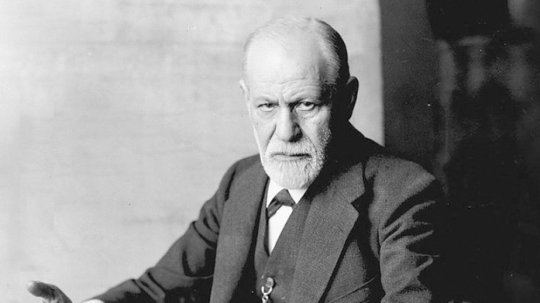
Arrivals & Departures
06 May 1856 – 23 September 1939
Celebrate Sigismund Schlomo Freud [Sigmund Freud] Day!
Sigmund Freud (/frɔɪd/ FROYD; German: [ˈziːkmʊnt ˈfʁɔʏt]; born Sigismund Schlomo Freud; 06 May 1856 – 23 September 1939) was an Austrian neurologist and the founder of psychoanalysis, a clinical method for treating psychopathology through dialogue between a patient and a psychoanalyst.
Freud was born to Galician Jewish parents in the Moravian town of Freiberg, in the Austrian Empire. He qualified as a doctor of medicine in 1881 at the University of Vienna. Upon completing his habilitation in 1885, he was appointed a docent in neuropathology and became an affiliated professor in 1902. Freud lived and worked in Vienna, having set up his clinical practice there in 1886. In 1938, Freud left Austria to escape the Nazis. He died in exile in the United Kingdom in 1939.
In founding psychoanalysis, Freud developed therapeutic techniques such as the use of free association and discovered transference, establishing its central role in the analytic process. Freud's redefinition of sexuality to include its infantile forms led him to formulate the Oedipus complex as the central tenet of psychoanalytical theory. His analysis of dreams as wish-fulfillments provided him with models for the clinical analysis of symptom formation and the underlying mechanisms of repression. On this basis Freud elaborated his theory of the unconscious and went on to develop a model of psychic structure comprising id, ego and super-ego. Freud postulated the existence of libido, a sexualised energy with which mental processes and structures are invested and which generates erotic attachments, and a death drive, the source of compulsive repetition, hate, aggression and neurotic guilt. In his later works, Freud developed a wide-ranging interpretation and critique of religion and culture.
Though in overall decline as a diagnostic and clinical practice, psychoanalysis remains influential within psychology, psychiatry, and psychotherapy, and across the humanities. It thus continues to generate extensive and highly contested debate with regard to its therapeutic efficacy, its scientific status, and whether it advances or is detrimental to the feminist cause. Nonetheless, Freud's work has suffused contemporary Western thought and popular culture. W. H. Auden's 1940 poetic tribute to Freud describes him as having created "a whole climate of opinion / under whom we conduct our different lives."
2 notes
·
View notes
Text
Sigmund Freud e o “homem psicológico”
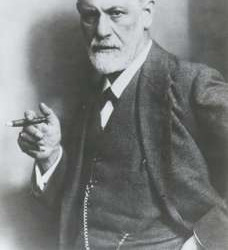
Sigmund Schlomo Freud, nascido Sigismund, veio ao mundo no dia 6 de maio de 1856 em Freiberg in Mähren (hoje na República Tcheca) e faleceu em Londres, dia 23 de setembro de 1939. Sigmund Freud foi o responsável pela primeira revolução no estudo da mente humana.
Freud pode ser justamente chamado de legislador intelectual mais influente de sua época. Sua criação, a psicanálise, foi ao mesmo tempo uma teoria da psiquê humana, uma terapia para o alívio de seus males e uma óptica para a interpretação da cultura e da sociedade. Apesar de críticas repetidas, tentativas de refutação e qualificações do trabalho de Freud, suas ideias permaneceram poderosas bem após sua morte e em campos muito distantes da psicologia. Se, como o sociólogo americano Philip Rieff afirmou uma vez, o "homem psicológico" substituiu noções anteriores como homem político, religioso ou econômico como a auto-imagem dominante do século 20, é em grande parte devido ao poder da visão de Freud e a aparente inesgotabilidade do legado intelectual que ele deixou para trás.
Sigmund Freud era filho de Jacob Freud (um judeu proveniente da Galícia e comerciante de lã) e de sua terceira mulher, Amalie Nathanson (1835-1930). Nascido com o nome de Sigmund Schlomo Freud em 1856, Freud foi anotado no Registro Civil como Segismundo Schlomo Freud. Freud, com dois anos de idade, mudou-se com sua família primeiro para Lípsia na Alemanha e logo após mudou-se para Viena em 1860, quando tinha quatro anos de idade, por causa de problemas financeiros e de problemas de saúde de sua família.
Aos 17 anos, ele ingressou na Universidade de Viena, no curso de Medicina. Notório por ser um aluno brilhante, durante os anos de faculdade, trabalhou intensamente no laboratório de neurofisiologia, até formar-se em 1881. Em 1882, conheceu Martha Bemays e em 1886, quando Freud já possuía consultório particular, casam-se
Freud foi um estudante de Medicina e um jovem médico com ambições grandes, alguém que desejava se tornar famoso fazendo descobertas importantes, mas certamente situadas dentro dos marcos estritos da pesquisa científica clássica. Foi assim que, com 20 anos, fez suas primeiras pesquisas dissecando as glândulas sexuais das enguias, em Trieste, sendo então admitido no laboratório de Ernst von Brücke (1819-1892), considerado o pai da Fisiologia na Áustria. Trabalhou durante alguns anos ali. Fez estudos anatômicos sobre o sistema nervoso da lampreia, tendo chegado perto da descoberta do que Heinrich Wilhelm von Waldeyer (1836-1921), alguns anos depois (1891), chamaria de neurônio.
Freud tornou-se especialista em doenças nervosas e criou uma nova teoria, a qual estabelecia que pessoas que ficavam com a mente doente eram aquelas que não colocavam seus sentimentos para fora. Segundo Freud, esse tipo de pessoa tinha a capacidade de fechar de tal maneira os sentimentos dentro de sua mente, que, após algum tempo, esquecia-se da própria existência.
Ao longo dos anos de estudo, fundamentou suas teorias psicanalíticas da mente e lançou, em 1895, em parceria com o médico Joseph Breuer – seu principal colaborador, a obra "Estudos sobre Histeria". Insatisfeito com a hipnose, Freud desenvolveu o que é uma das bases da técnica psicanalítica na atualidade: a livre associação, em que o paciente é convidado a falar o que lhe vem à mente para revelar memórias reprimidas causadoras de neuroses.
Freud prosseguiu com os estudos, orientado por sua inferência de que a alma humana poderia estar dividida em uma dualidade entre psique e eros, que em tentativas de união, ocasionavam os sintomas. Com o desenvolvimento da teoria (até então simples), estruturou a hipótese do inconsciente.
Em 1896, passou a estudar a natureza sexual dos traumas infantis e a delinear uma de suas principais teorias, o Complexo de Édipo.
Interessado nas manifestações do inconsciente, em 1900 publicou a primeira obra psicanalítica propriamente dita, Intitulada A Interpretação dos Sonhos.
Seis anos depois, juntou-se aos intelectuais Adler, Jung, Jones e Stekel, que em 1908 se reuniram no primeiro Congresso Internacional de Psicanálise, em Salzburg. No ano seguinte, foram convidados a dar conferências nos EUA, na Clark University, em Worcester. Em 1910, por ocasião do segundo congresso internacional de psicanálise, realizado em Nuremberg, o grupo fundou a Associação Psicanalítica Internacional.
Entre 1911 e 1913, ocorreram diversas divergências teóricas que resultaram na separação dos pesquisadores. Foi especialmente marcante o afastamento com Jung, com quem nutria intensa amizade.
Os últimos anos de Freud consistiram em tempos de sofrimento com um câncer e expansão do nazismo na Europa. Já doente quando o exército tomou Viena, teve seus bens confiscados e biblioteca queimada. Resgatado, refugiou-se em Londres, Reino Unido.
Faleceu no dia 23 de setembro de 1939. Além de ter como legado a psicanálise, deixou uma extensa obra, traduzida em cerca de 30 línguas, composta por 24 livros, 123 artigos, 5 grandes casos clínicos (Dora, Pequeno Hans, Schereber, Homem dos Ratos e Homem dos Lobos), prefácios, necrológicos, intervenções diversas em congressos, contribuições para enciclopédias e aproximadamente de 20 mil cartas.
2 notes
·
View notes
Text
Фройд: цікаві факти з життя та досліджень
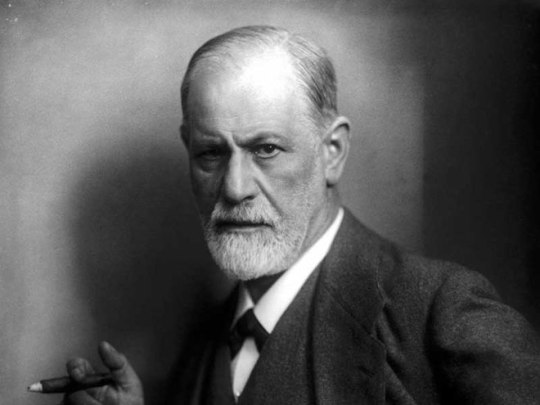
6 травня 1856 року у місті Фрайбург Австро-Угорщини (зараз Пржибор, Чехія) народився Сиґізмунд Шломо Фройд (Sigismund Schlomo Freud) — один з найскандальніших та неординарних вчених XX століття. Розкажу про деякі цікаві факти з його біографії та досліджень.
Зиґмунд Фройд (Зигмунд Фрейд) — австрійський психолог і невролог еврейського походження, вивчав людське несвідоме (дії природжених інстиктивних потягів у психічному житті людини). Він розвинув методику вільних асоціацій та тлумачення сновидінь, яку було покладено в основу психоаналізу, і сформулював коцепцію структури психіки (Ід, Еґо та Супереґо, або Воно, Я і Над-Я). Отримав премію Гете у 1930 році за літературні досягнення.
Зиґмунд був одним з 8 дітей у сім’ї та улюбленцем матері. Сім’я жила бідно, діти займалися при свічках, окрім найкращого учня з них — Зиґмунда, якому виділили керосинову лампу і навіть окрему кімнату.
Він пішов у медицину, тому ще це могло принести реальний дохід навідміну від вивчення літератури та філософії, якими він захоплювався ще з гімназії. Але до професії лікаря він не мав жодного інтересу.
Фройд був достатньо забобонним і боявся чисел 6 і 2. Наприклад, він ніколи не жив у готелях, в яких було більше ніж 61 номер. А 6 лютого він не виходив на вулицю.
Він боявся жінок, тому позбувся невинності в 30 років.
Він мав феноменальну фотографічну пам’ять, міг просканувати поглядом будь-яку інформацію і відразу запам’ятати її.
Фройд нелюбив музику і не ходив у місця, де вона звучала. Він не відвідував ресторани, в яких грав оркестр. Навіть викинув піаніно своєї сестри, яка дратувала його постійною грою.
Зиґмунд був поліглотом. Він знав: німецьку, давньоєврейську, латинську, англійську, грецьку, французьку, італійську і іспанську.
Фройд дуже багато курив, за день міг викурити 20 сигар. Вважав куріння величнішим у житті задоволенням.
Ввів термін «дитячий церебральний параліч (ДЦП)».
Перша наукова статтья була присвячена виявленню статевих відмінностей у річкових вігрів.
Вживав кокаїн більше 6 років. Але робив він це щоб вивчити вплив наркотику на організм. В той час кокаїн широко використовувався як анестетик. Він також давав його своїй вагітній дружині — йому було цікаво дізнатися, як під дією кокаїну розвивається майбутня дитина. Всі спостереження він докладно описував у щоденнику. Після цього він визнав цей наркотик вкрай небезпечним.
Деякий час для лікування хворих Фройд використовував гіпноз.
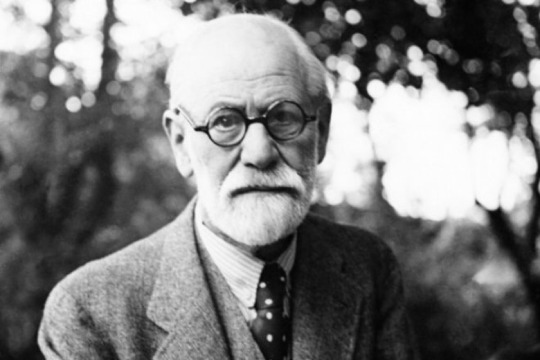
Він вважав, що у кожної людини є бажання, в яких нікому не зізнається, а є ті, в яких людина не зможе зізнатися навіть собі.
Був впевнений, що ми всі обираємо людей не випадково. Ми зустрічаємо тільки тих, хто вже існує в нашій підсвідомості.
Всі продовгуваті предмети Фройд ототож��ював з фалічним символом, а тому вважав куріння прототипом орального сексу.
Згідно його дослідженням, всі входи: двері та арки символізують жіночий початок.
Зиґмунд вірив, що осягнути кохання можливо, але для цього чоловіку потрібно бути з однією жінкою. Той, у кого багато партнерів, просто любить жінок, але не осягнув істинного кохання.
Єдиним сексуальним відхиленням Зиґмунд Фройд називав тільки відсутність сексу.
Найважливішим доступом у підсвідомість людини він вважав сновидіння.
Його називали шарлатаном і сексуальним маніяком через викриття ним сексуальної етіології неврозів.
Праці Фройда у фашистській Німеччині спалювалися. Фройд зміг виїхати з Німеччини тільки за непрямою допомогою президента США Франка Рузвельта і французької принцеси Марії Бонапарт.
Роботи склали 24 томи. Він залишив після себе близько 4000 тисяч листів.
Фройд багато подорожував, щоб про психоаналіз дізналися усюди. У 1909 році його із захватом прийняли в Америці, проте знаменитому доктору не сподобалася місцева кухня.
У 1923 році у Фройда був виявлений рак піднебіння. Він переніс 33 операції.
У 1938 році він переїхав в Лондон, де Сальвадор Далі зізнався, що захоплюється ним.
У 83 роки, щоб припинити страждання, він просить лікаря зробити йому смертельну ін’єкцію морфію. Так він став першим об’єктом евтаназії.
Фройд вважав, що великі люди ніколи не помирають, так як, по своїй заяві, він порушив сон людства.
Текст: Юлія Артюшенко
3 notes
·
View notes
Text
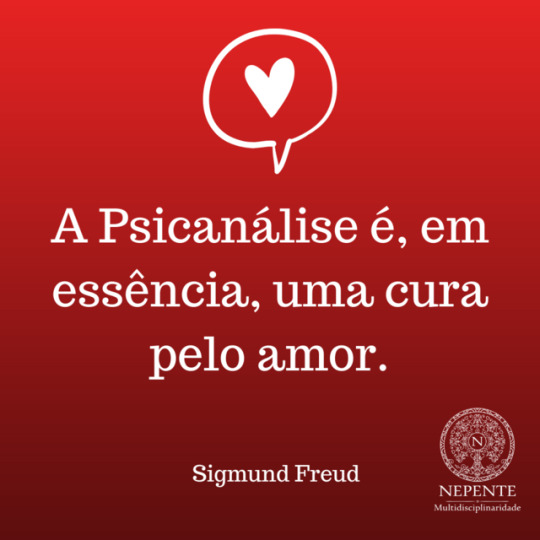
06 de maio: aniversario de Sigmund Freud. Pai da Psicanálise.
“Sigmund Freud (1856-1939) foi um médico neurologista e importante psicólogo austríaco. Foi considerado o pai da psicanálise, que influiu consideravelmente sobre a Psicologia Social contemporânea.
Sigismund Schlomo Freud nasceu em Freiberg, na Morávia, então pertencente ao Império Austríaco, no dia 6 de maio de 1856. Filho de Jacob Freud, pequeno comerciante e de Amalie Nathanson, de origem judaica, foi o primogênito de sete irmãos. Aos quatro anos de idade, sua família muda-se para Viena, onde os judeus tinham melhor aceitação social e melhores perspectivas econômicas.
... Pai da Psicanálise
Em pouco tempo, Freud conseguiu dar um passo decisivo e original que abriu perspectivas para o desenvolvimento da psicanálise ao abandonar a hipnose, substituindo-a pelo método das livres associações, passando então a penetrar nas regiões mais obscuras do inconsciente, sendo o primeiro a descobrir o instrumento capaz de atingi-lo e explorá-lo em sua essência.
Durante dez anos, Freud trabalhou sozinho no desenvolvimento da psicanálise. Em 1906, a ele juntou-se Adler, Jung, Jones e Stekel, que em 1908 se reuniram no primeiro Congresso Internacional de Psicanálise, em Salzburg. O primeiro sinal de aceitação da Psicanálise no meio acadêmico surgiu em 1909, quando foi convidado a dar conferências nos EUA, na Clark University, em Worcester.
Em 1910, por ocasião do segundo congresso internacional de psicanálise, realizado em Nuremberg, o grupo fundou a Associação Psicanalítica Internacional, que consagrou os psicanalistas em vários países. Entre 1911 e 1913, Freud foi vítima de hostilidades, principalmente dos próprios cientistas, que, indignados com as novas ideias, tudo fizeram para desmoralizá-lo. Adler, Jung e toda a chamada escola de Zurique separaram-se de Freud.”
https://www.ebiografia.com/sigmund_freud/
1 note
·
View note
Text
My bio
Sigmund Freud born Sigismund Schlomo Freud on 6 May 1856 – 23 September 1939) was an Austrian neurologist and the founder of psychoanalysis, a clinical method for treating psychopathology through dialogue between a patient and a psychoanalyst.
Freud was born to Galician Jewish parents in the Moravian town of Freiberg, in the Austrian Empire. He qualified as a doctor of medicine in 1881 at the University of Vienna. Upon completing his habilitation in 1885, he was appointed a docent in neuropathology and became an affiliated professor in 1902. Freud lived and worked in Vienna, having set up his clinical practice there in 1886. In 1938 Freud left Austria to escape the Nazis. He died in exile in the United Kingdom in 1939.
In creating psychoanalysis, Freud developed therapeutic techniques such as the use of free association and discovered transference, establishing its central role in the analytic process. Freud's redefinition of sexuality to include its infantile forms led him to formulate the Oedipus complex as the central tenet of psychoanalytical theory. His analysis of dreams as wish-fulfillments provided him with models for the clinical analysis of symptom formation and the underlying mechanisms of repression. On this basis Freud elaborated his theory of the unconscious and went on to develop a model of psychic structure comprising id, ego and super-ego. Freud postulated the existence of libido, a sexualised energy with which mental processes and structures are invested and which generates erotic attachments, and a death drive, the source of compulsive repetition, hate, aggression and neurotic guilt. In his later works, Freud developed a wide-ranging interpretation and critique of religion and culture.
Though in overall decline as a diagnostic and clinical practice, psychoanalysis remains influential within psychology, psychiatry, and psychotherapy, and across the humanities. It thus continues to generate extensive and highly contested debate with regard to its therapeutic efficacy, its scientific status, and whether it advances or is detrimental to the feminist cause. Nonetheless, Freud's work has suffused contemporary Western thought and popular culture. In the words of W. H. Auden's 1940 poetic tribute to Freud, he had created "a whole climate of opinion / under whom we conduct our different lives."
2 notes
·
View notes
Link
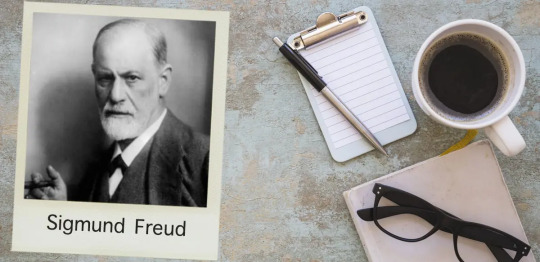
🎂 Azi îl celebrăm pe Sigmund Freud.Cărțile autorului au astăzi preț special, cu până la 28% reducere față de prețul afișat.
0 notes
Photo
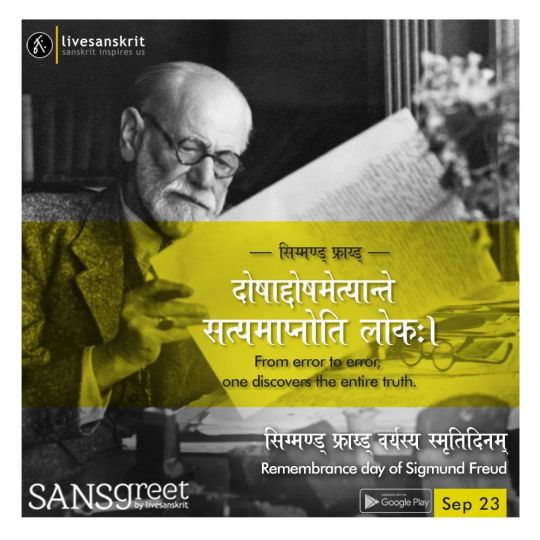
Send from Sansgreet Android App. Sanskrit greetings app from team @livesanskrit . It's the first Android app for sending @sanskrit greetings. Download app from https://livesanskrit.com/sansgreet Sigmund Freud. Sigmund Freud (born Sigismund Schlomo Freud; 6 May 1856 – 23 September 1939) was an Austrian neurologist and the founder of psychoanalysis, a clinical method for treating psychopathology through dialogue between a patient and a psychoanalyst. Freud was born to Galician Jewish parents in the Moravian town of Freiberg, in the Austrian Empire. He qualified as a doctor of medicine in 1881 at the University of Vienna. Upon completing his habilitation in 1885, he was appointed a docent in neuropathology and became an affiliated professor in 1902. Freud lived and worked in Vienna, having set up his clinical practice there in 1886. In 1938, Freud left Austria to escape Nazi persecution. He died in exile in the United Kingdom in 1939. #sansgreet #sanskritgreetings #greetingsinsanskrit #sanskritquotes #sanskritthoughts #emergingsanskrit #sanskrittrends #trendsinsanskrit #livesanskrit #sanskritlanguage #sanskritlove #sanskritdailyquotes #sanskritdailythoughts #sanskrit #resanskrit #sigmundfreud #sigmundfreudquote #neurologist #psychoanalysis #psychoanalyst #psychopathology #austria #moravia #hampstead #london #celebratingsanskrit #universityofvienna #unitedkingdom #ego #superego https://www.instagram.com/p/Ci2z-EHMDzD/?igshid=NGJjMDIxMWI=
#sansgreet#sanskritgreetings#greetingsinsanskrit#sanskritquotes#sanskritthoughts#emergingsanskrit#sanskrittrends#trendsinsanskrit#livesanskrit#sanskritlanguage#sanskritlove#sanskritdailyquotes#sanskritdailythoughts#sanskrit#resanskrit#sigmundfreud#sigmundfreudquote#neurologist#psychoanalysis#psychoanalyst#psychopathology#austria#moravia#hampstead#london#celebratingsanskrit#universityofvienna#unitedkingdom#ego#superego
0 notes